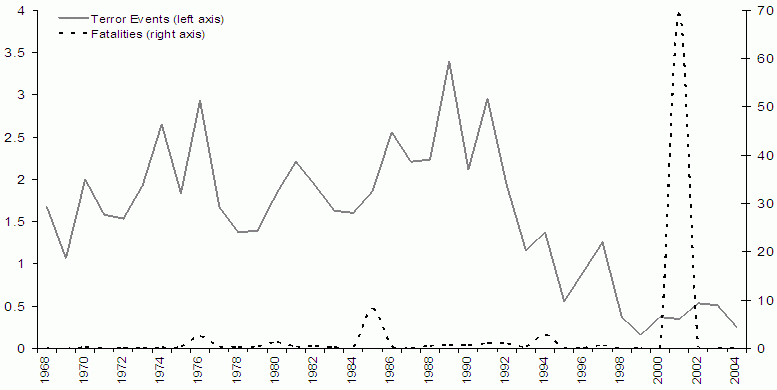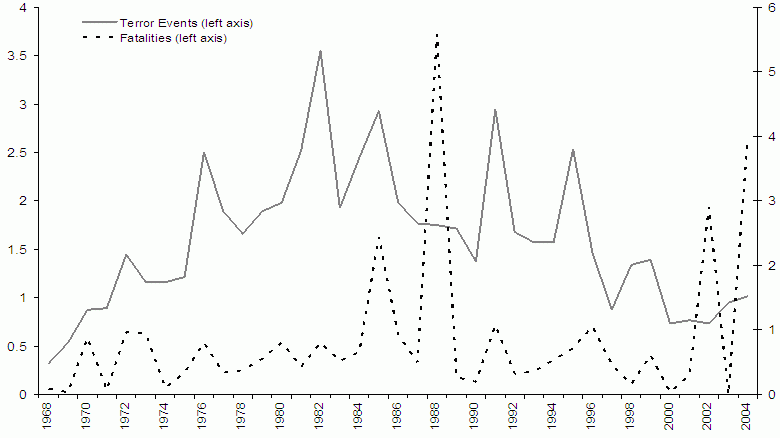What drives international terrorism? What are the deep causes influencing the behaviour of terrorist organisations over time and across countries? What can simultaneously explain the decreasing number of international terrorist acts since the mid 1980s and the increasing average number of fatalities from such acts? Although there is a large literature addressing these important policy questions (which has grown exponentially since 9/11), the existing empirical estimates still diverge in size, sign and significance (for reviews see among others Krueger, 2007, and Llusa and Tavares, 2008).
Figure 1. Average number (per country) of international terrorist events and fatalities in the Americas
Figure 2. Average number (per country) of international terrorist events and fatalities in Europe
Two potential explanations have received the most attention – poverty and democracy. One possibility is that extreme poverty forces people into desperate acts of terror. Low levels of economic development would mean fewer job opportunities and make terror a more attractive option. As for democracy, the intuition is similar in that the lack of political opportunities would make terrorism a more attractive and, to an extent, more justifiable option. The empirical literature on these matters is still inconclusive. There are various papers showing per capita GDP to be important determinants of international terrorism (e.g., Blomberg et al., 2004) and others arguing the opposite (e.g., Krueger and Maleckova, 2003). The same happens regarding democracy, as Abadie (2006) reports that political rights are a main explanation for terrorism and Tavares (2004) argues otherwise.
In Campos and Gassebner (2009), we present a new potential explanation for international terrorism that has received almost no attention in the empirical literature. We call it the escalation effect. It refers to the notion that domestic political instability is a deep cause of (escalates into) international terror attacks. Our estimates reveal that the occurrence of violent domestic political instability increases the number of international terror attacks by approximately 30% and the number of fatalities caused by such attacks by about 50%.
Political instability and international terrorism
Our study is based on a unique annual data set encompassing various aspects of international terrorism and covering more than 130 developing and developed countries from 1968 until 2003. The main finding is that civil wars and guerrilla warfare are robustly associated with the occurrence of international terrorist attacks, while riots and strikes are not, and this association is even stronger for fatalities than for the number of attacks. Moreover, per capita GDP, openness to trade, and foreign aid are found not to be systematically important in explaining international terrorism. In contrast, political proximity to the US does seem to generate international terrorism, when proximity is measured as the share of votes cast in the United Nations General Assembly that are in line with the US vote.
We also uncover extremely important differences across regions. In Asia, civil war and riots are the main determinants of international terrorism acts; in the Americas it is guerrilla warfare; in Africa it is riots; in the Middle East international terror is driven by a combination of civil wars and guerrilla warfare. In Europe, we find that none of the violent forms of domestic political instability are related to the occurrence of terror acts. Yet there is substantial evidence that the duration of political regimes in Europe is negatively related to the occurrence of international terror acts.
What are the mechanisms through which the escalation effect may operate? Although the difficulties in disentangling such mechanisms are well-known, our conjecture is that the main mechanism at work has to do with learning-by-doing and the accumulation of terrorist human capital. Terror requires schooling and sophisticated training. Politically unstable countries offer propitious conditions. It has been correctly noted that terrorist groups’ human resource policies favour better-educated or higher-income individuals. A related aspect that has received less attention is that terrorism requires specific human capital and involves a complex mix of skills that are costly to acquire and maintain. Moreover, certain forms of domestic political instability (such as guerrilla warfare and civil war) provide for the honing of military, tactical, and organisational skills needed to carry out terrorist acts, while other forms (anti-government demonstrations and strikes) are not likely to advance the same level or types of skills.
Fighting terrorism by reducing political violence
In conclusion, the containment of guerrilla warfare and civil war may not only be a virtue in itself. The international community should also be attentive to the fact that such containment may generate valuable externalities. Specifically, the occurrence and severity of international terrorism might be substantially reduced by coordinated efforts to contain political violence across the globe.
References
Abadie, A. (2006), “Poverty, Political Freedom, and the Roots of Terrorism,” American Economic Review, 96(2): 50-56.
Blomberg, B., Hess, G.D. and A. Weerapana (2004), “Economic Conditions and Terrorism,” European Journal of Political Economy 20(2): 463-478.
Campos, Nauro and Martin Gassebner (2009), “International Terrorism, Political Instability and The Escalation Effect,” CEPR DP 7226.
Krueger, Alan (2007) What Makes a Terrorist: Economics and the Roots of Terrorism, Princeton: Princeton University Press.
Krueger, A.B. and J. Maleckova (2003), “Education, Poverty and Terrorism: Is there a Casual Connection?” Journal of Economic Perspectives, 17(4): 119-144.
Llussá, Fernanda and Jose Tavares (2008), “Economics and Terrorism: What We Know, What We Should Know, and the Data We Need,” in P. Keefer and N. Loyaza (eds), Terrorism, Economic Development, and Political Openness, Cambridge University Press, 233-254.
Tavares, J. (2004), “The Open Society Assesses its Enemies: Shocks, Disasters and Terrorist Attacks,” Journal of Monetary Economics, 51(5): 1039-1070




